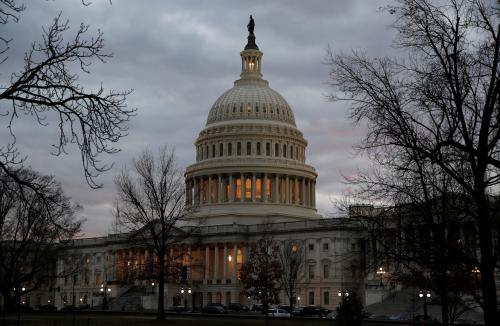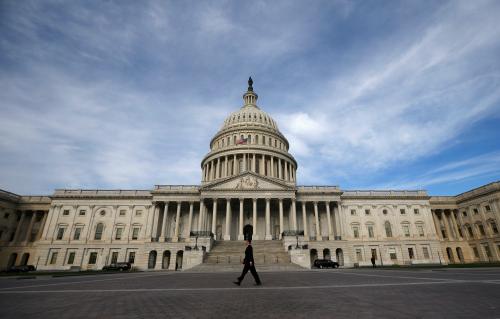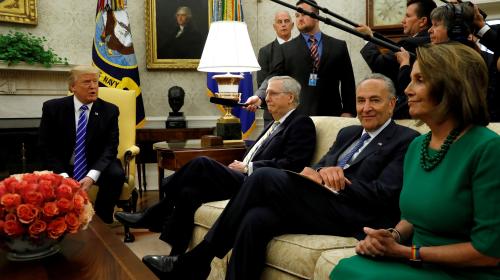This post is part of series by Brookings experts on Trump in 2018.
The first year of Donald Trump’s presidency has been dizzyingly, at times almost laughably, confusing for Republicans in Congress. The party’s legislative leaders, operating on a very different wavelength from the unorthodox (and legislatively unskilled) administration, have had to figure out exactly how much governing their fractious coalition could bear now that it controls both chambers of Congress and the White House. For a while, it looked like the answer might be none.
The historic passage of the Tax Cuts and Jobs Act of 2017 shows the party nearly unified in shouldering responsibility for a number of big decisions, though. Most obviously, there are the massive corporate and individual tax cuts along with bracket changes, some reforms of deductions, and significant changes to how multinationals’ international earnings will be treated. The Act also includes the repeal of the Affordable Care Act’s individual mandate and opens a portion of the Arctic National Wildlife Refuge to oil drilling. Whatever one thinks of the policy and political merits of these changes, there is no question that they show Republicans willing and able to make major changes through legislation.
That accomplishment is a testament to the floor management skills of Speaker of the House Paul Ryan and Senate Majority Leader Mitch McConnell, and they would no doubt like to bask in the happy glow of victory for a time. Alas, they will have no chance to do so, as potentially more divisive questions over the Children’s Health Insurance Program (CHIP), annual spending, and the status of “dreamers” demand near-immediate action. As Matt Glassman argues, leadership is likely to have to seek out Democratic votes on all of these issues.
If the caucus can somehow survive those ordeals intact (or bury the bad feelings they engender), their next big priorities also seem likely to surface tensions that were successfully suppressed when dealing with tax cuts (or even Obamacare repeal, which came up short of passage by one vote). Infrastructure spending and entitlement reform, which are now White House and conservative priorities, respectively, are likely to cause very sharp disagreements, not to mention possibly activating President Trump’s campaign deviations from the standard party line in unpredictable ways.
All of those substantive challenges are going to bring out procedural grievances that have already produced a steady roar. Republicans decided to hang together in 2017 and ultimately ratify a massive tax bill produced by a highly centralized, closed process—but they have been noisily complaining about the lack of deliberation, lack of chances for amendment, and generally a lack of input for members outside of leadership. (This is to say nothing of Democratic complaints about the process, which have also been legion.) Ryan, who rose to the speakership making promises of regular order, has in practice taken a very different path, and now finds himself in a predicament not dissimilar to the one faced by his predecessor, John Boehner—and possibly envisioning his own exit, without any obvious successor. For Congress, 2018 is therefore likely to be even more topsy-turvy than this last roller-coaster-ride of a year has been.
As members of Congress make the journey from here to the midterm elections next November, they should be thinking long and hard about what they want out of their institution. It’s tempting to think of the legislature’s purpose as just producing legislation—in which case various observers think that what legislators need to learn to do better is pipe down and follow the lead of either the president or powerful party elites.
But that’s actually a very impoverished view of what Congress’s role is supposed to be in our Constitutional system. As I argue in a new article for National Affairs, representative government as embodied in Congress needs to serve deeper goals: “promoting provisional coalition building, generating trust, and creating real political accountability.” To play these roles, Congress needs to be more than a place where party leaders attempt to ram through partisan bills when the stars align. It needs to be a body of people struggling to figure out which problems really require collective action at the federal level and how they can best be addressed—without knowing exactly where they will end up. By being open to provisional, purpose-specific compromises, our representatives can help our diverse citizenry find surprising ways to live together as no other government officials are able to do.
That, anyway, is the ideal we ought to have in mind. We will have to see whether rank-and-file legislators, dissatisfied with a system that reduces them to little more than seat fillers, will find a way to pursue it as they fight over what Congress is to be in the new year.









Commentary
Trump in 2018: A defining year ahead for Congress as an institution
December 27, 2017